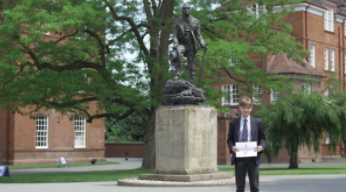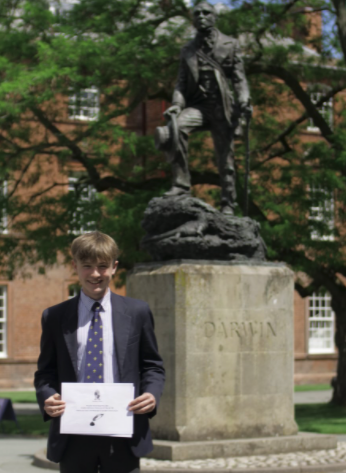Shrewsbury
Amazing efforts from pupils for Junior School Essay Prize


The winner of this year’s Junior School Essay Prize has been announced as Luke W (SH, IV).
Head of Academic Enrichment, Harry Mackridge, said:
The 2021 Junior Essay Prize witnessed a slightly changed format to reflect the unusual circumstances of the year! Pupils were provided a range of questions covering core syllabus and super-curricular concepts and challenged to respond in no more than 500 words.
The prize was open to all Third and Fourth Form pupils with an encouraging turnout reflecting significant academic engagement in the school community. Enjoy Luke’s winning entry.

One day humans will have to leave earth in order to survive. What physical barriers will need to be overcome to make this a success?
"There is a hesitant acceptance that the human race has left an irreparable footprint on this planet and its delicate ecosystem. The population is exponentially expanding, and recently, rapid industrialisation, pollution, and deforestation to name a few have been asphyxiating the finely balanced climate. Physicists have been mulling over a resolution, and colonising another planet has become a tenable consideration.
Deciding on a suitable planet would be the first confrontation; we could either select a rocky planet which lies within the solar system, or pinpoint an earth-like exoplanet. The latter inevitably involves a formidable distance, with the nearest star being over four light years away, but if analysis is correct, it could harbour water, and guarantee a pivotally manageable framework for the continuity of humanity. Travelling to a more proximal planet provides a more plausible distance, but would introduce a problematic environment.
Considering the barriers for mars to begin with, although the gravity may be not too dissimilar, the terrain is arid, the weather is unpredictable, and the atmosphere composition is fatal to humans. Installing pressurised buildings would promise regular ventilation, but transporting parts would be cumbersome, and reaching escape velocity from earth would prove onerous. Liquid water must also be created through chemical reactions, either purified for drinking or redistributed to vegetation. To conserve the scarcity of water, a synthetic water cycle would have to be established.
As for the obstacle of power and nourishment, a transparent roof could exploit the sun’s oppressive heat, to aid the growth of renewable sustenance. Our star could also be used to generate solar power; the cumulative force of a dust storm could additionally be trapped through a network of robust turbines either exposed directly above ground, or manipulating the gusts to a more protected alignment of turbines underground.
If instead physicists decided to locate a world that twins earth, light years dissociate humanity from this pedestalised proposal. Modern day rocket propulsion would take thousands of years to even cover one light year, concluding that chemical fuel is insufficient. There are two alternatives: either the power source is ground-based, or situated onboard. The craft could use nuclear propulsion, preferably fusion, which yields profoundly more, but has not been tamed yet. Contrarily, ground-based lasers could precisely point at a reflective sail on the vessel, spurring it through the vacuum of space, but the accuracy and potency is yet to be surmounted.
In conclusion, not only is radical advancement required in the preparation, and in the adaption following colonisation, but a discernment must be made. Do we naively wander through the vacuum of space, to acquaint ourselves with a distant sibling of earth, or do we engineer our neighbour? Mother nature is knocking on death’s door, and we are holding tightly onto her hand. Mountainous advancements loom above humanity, but incessant progress will unshackle us, and humanity may live on."



.jpg&command_2=resize&height_2=85)















.jpg&command_2=resize&height_2=85)


